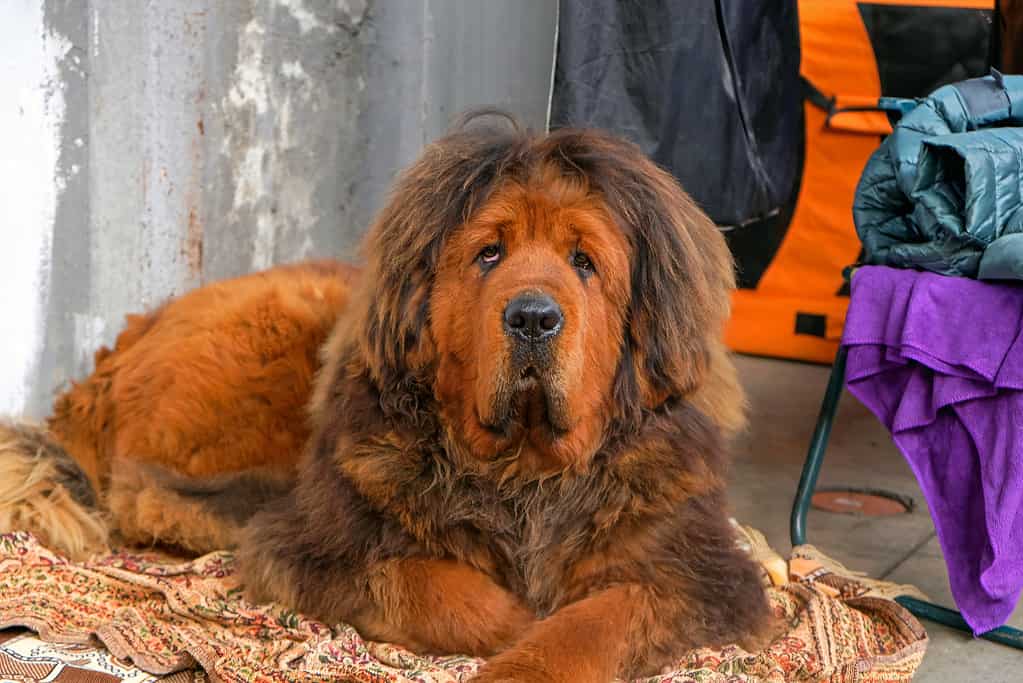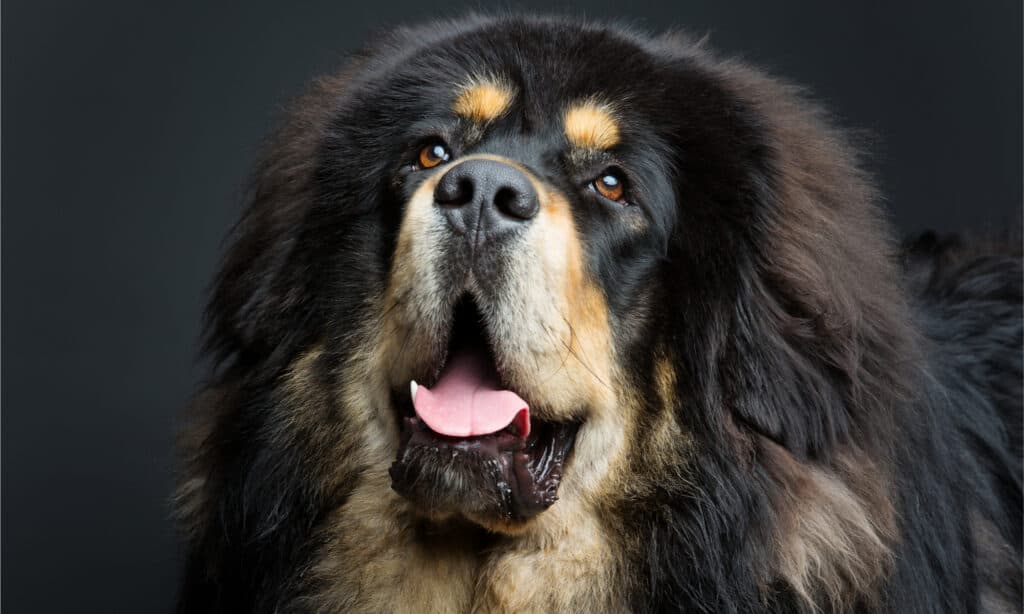The Tibetan Mastiff is a protective and independent dog breed. While they are often loving toward their owners, they can also be aggressive toward anyone they see as a threat. As ancestors of Bernese Mountain Dogs, Great Pyrenees, Rottweilers, and Saint Bernards, Tibetan Mastiffs measure 24 inches or greater in height and weigh between 70 to 150 pounds.
Not only are they large dogs, but they’re also extremely intelligent, so they easily grow bored by repetitive routines or commands. However, they’re known to be great family dogs — especially since they’re so protective of their families.
If you want to adopt or rescue a Tibetan Mastiff, you might be curious about its average lifespan and the breed’s overall health. Here’s how long Tibetan Mastiffs typically live — and some common health concerns of the pup.
Tibetan Mastiff Lifespan
The average lifespan of a Tibetan Mastiff is 10 to 12 years. Of course, this varies as it depends on the individual dog, its health issues, and its environment. To help support a lengthy lifespan for your pup, book regular vet visits, ensure it gets daily exercise, and feed it a healthy diet. Additionally, make sure it has all the love and care it needs, as this can make all the difference in your pup’s life.
Common Health Concerns of Tibetan Mastiffs
Tibetan Mastiffs have several common health concerns you’ll want to keep in mind as an owner. Here are the most common health issues these dogs face.

Tibetan Mastiffs are one of the oldest dog breeds in the world.
©Tetiana Kolubai/iStock via Getty Images
Hip Dysplasia
Hip dysplasia is common in Tibetan Mastiffs and occurs when a dog’s joints don’t properly develop. This condition can make it difficult for your dog to walk or play and cause daily pain. Often, treatment, such as surgery to improve or preserve the pup’s physical function, is required for your dog to live a normal life.
Elbow Dysplasia
Another common health concern in Tibetan Mastiffs is elbow dysplasia. Similar to hip dysplasia, this condition affects the elbow joints in your dog. It’s an inherited condition most common in larger dog breeds like the Tibetan Mastiff. Just like with hip dysplasia, elbow dysplasia can cause daily pain and limited physical abilities and often requires surgery for comfortable living.
Hypothyroidism
Hypothyroidism is another common condition in Tibetan Mastiffs. This is an abnormality of the thyroid gland. Hypothyroidism in dogs can lead to weight gain, lethargy, cold intolerance, excessive shedding, and a lower-quality coat. Additionally, your pup might experience mental dullness and other behavioral abnormalities. Typically, dogs must be treated for life when they have hypothyroidism. This can be via thyroid hormone replacement therapy with the use of FDA-approved drugs that will improve thyroid function.
Eye Anomalies
Tibetan mastiffs also experience different types of eye conditions that can become quite serious over time. One common issue in this dog breed is progressive retinal atrophy, which is an eye disease that can lead to blindness. Though the condition is typically not painful for the dog, it can progress slowly over time and eventually lead to complete blindness in your beloved pup.

Tibetan Mastiffs are prone to various eye conditions and irritations.
©Svetography/Shutterstock.com
Another common eye anomaly is entropion. This is a condition that causes the eyelid to roll in, with eyelashes rubbing against the dog’s cornea. This can occur in one or both eyes and impact the upper and lower lids. If left untreated, your pup can develop corneal ulceration, an open sore on the outer layer of the cornea, and can be pretty painful.
Like entropion, ectropion is common and occurs when the eyelids roll outward. This can expose the pup’s eyes, including its conjunctival tissues, causing dryness and a droopy appearance.
Ear Infections
One more common health issue in Tibetan Mastiffs is an ear infection. Due to their narrow ear canals, these dogs are prone to more frequent ear infections. Though not serious, ear infections can be quite painful and uncomfortable for your pup. Keep your dog’s ears as clean as possible to prevent them from developing. If you do notice signs of an infection, such as your dog frequently scratching at its ear or a strong odor, take your pooch to the vet immediately so you can properly treat the infection.
Caring for Your Tibetan Mastiff
When it comes to giving your pup the best and most extended life possible, you must prioritize its health and well-being. Invest in the right food, stay on top of regular vet visits, and keep an eye out for the above common health issues. Provide your Tibetan Mastiff with all the love and support it needs, and you will likely reap a long lifetime with your pup.
The photo featured at the top of this post is © Oleksandr Hryvul/iStock via Getty Images
Thank you for reading! Have some feedback for us? Contact the AZ Animals editorial team.






